Saint Frances: Will Gompertz reviews film by first-time writer Kelly O'Sullivan ★★★★☆
- Published
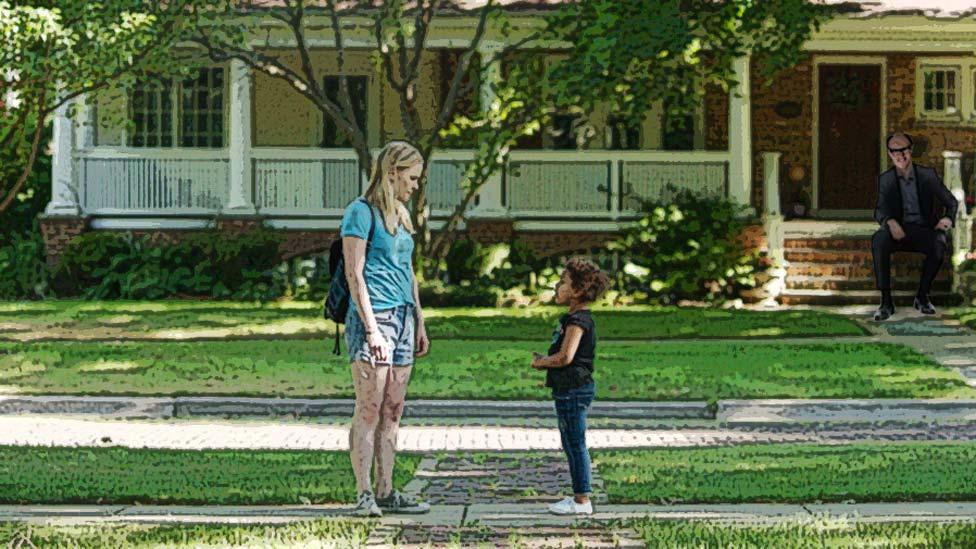
It has taken me a while to figure out what I thought about Saint Frances, a gentle drama built around the life of Bridget (Kelly O'Sullivan), a 34-year-old waitress yet to find her purpose in life. There was something really unusual about it that kept nagging away at me that I couldn't quite put my finger on.
Was it the wry humour and andante tempo? Or was it Kelly O'Sullivan, the movie's writer and star, whose performance was so wonderfully understated and natural? Or, was it simply the novelty of seeing a new film instead of a lockdown re-run?
I couldn't work it out. And then it dawned on me. It was none of the above.
The overwhelming sensation it left me with was one of profound relief.
In a world that has become increasingly loud and opinionated, where nuance has been flattened by a steam-roller of bile and bellicose rantings delivered from high offices and low lives; where social media is anything but, and dogma is the new democracy - here is a film that proves that we have not yet become totally and utterly deranged.
O'Sullivan gives us a contemporary American story that explores subjects such as post-coital menstruation, interracial lesbian relationships, the physical and emotional complexities of abortion, post-natal depression, and conception, and treats them all in a most un-Hollywood-like fashion. They are not sensationalised, or sexualised, or judged: instead, the issues and themes are treated for what they are, which is normal.
For this alone you could describe Saint Frances as being a quietly radical film, which refuses to be drawn into the headline-grabbing narrative of 21st Century communication and entertainment, and presents an alternative perspective; something that really needs fighting for: the telling of truths. Not home truths, or hidden truths, but every day, in plain sight, regular truths.
Bridget is a bit lost.
She hooks up with Jace (Max Lipchitz), who is eight years younger than her and has a millenial's capacity to be empathetic and emotionally intelligent, although his radar is not always reliable.
He thinks they're dating, she doesn't.
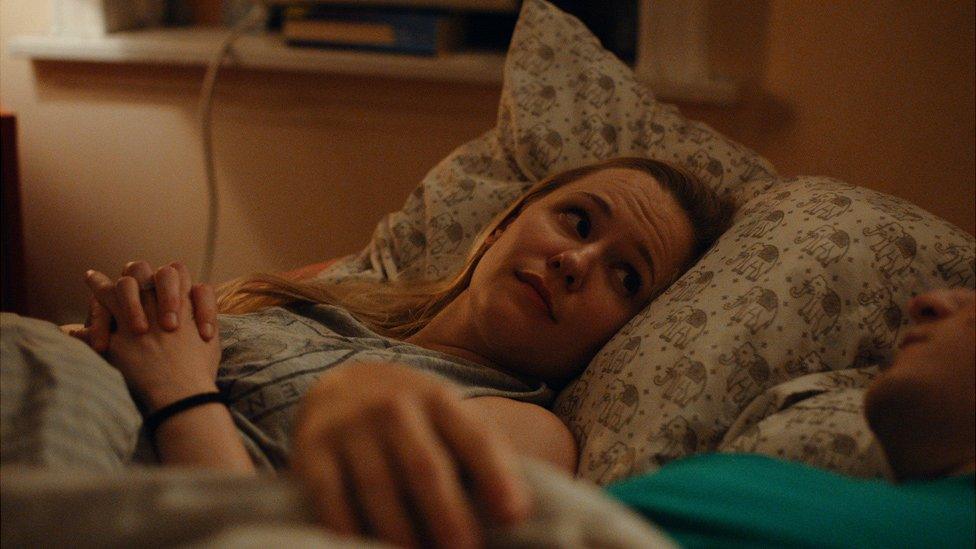
Bridget (Kelly O'Sullivan) doesn't feel she's in a relationship with Jace (Max Lipchitz), who thinks differently
He keeps a diary in which to record his feelings, she doesn't. He serves tables, she does too.
Until, that is, she takes a summer job as a nanny looking after Frances (played with virtuosic flair by Ramona Edith Williams), the mixed-raced six-year-old daughter of a well-to-do middle-aged lesbian couple, Maya (Charin Alvarez) and Annie (Lily Mojekwu).
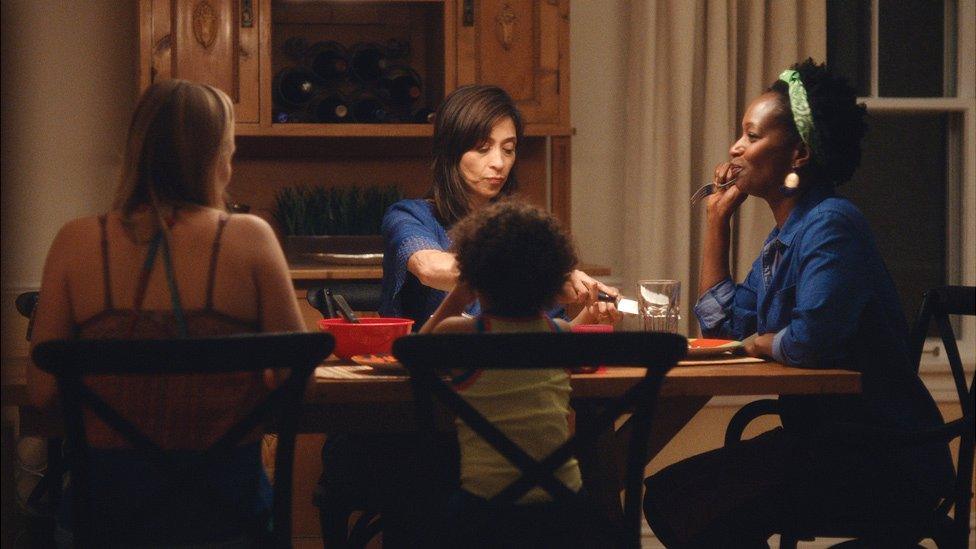
Bridget (back) getting to know Frances (Ramona Edith Williams), who's sitting next to her, and her employers Maya (Charin Alvarez), opposite her, and Annie (Lily Mojekwu) at the head of the table
Frances is precocious and confident, Bridget is introverted and uncertain.
What would be fairly familiar odd couple territory is given added texture by a series of well-drawn triangular relationships. There's the evolving friendship between Bridget, Frances and Maya - who is suffering from the blues having had a second child with whom she has not yet created a bond. And another, tinged with jealousy and guilt, between Bridget, Maya and her high-flying partner Annie.
There are more, as you will discover when you watch the movie, which was directed by Alex Thompson, O'Sullivan's real-life partner. Between the two of them and their assembled actors they have created several genuinely memorable scenes.
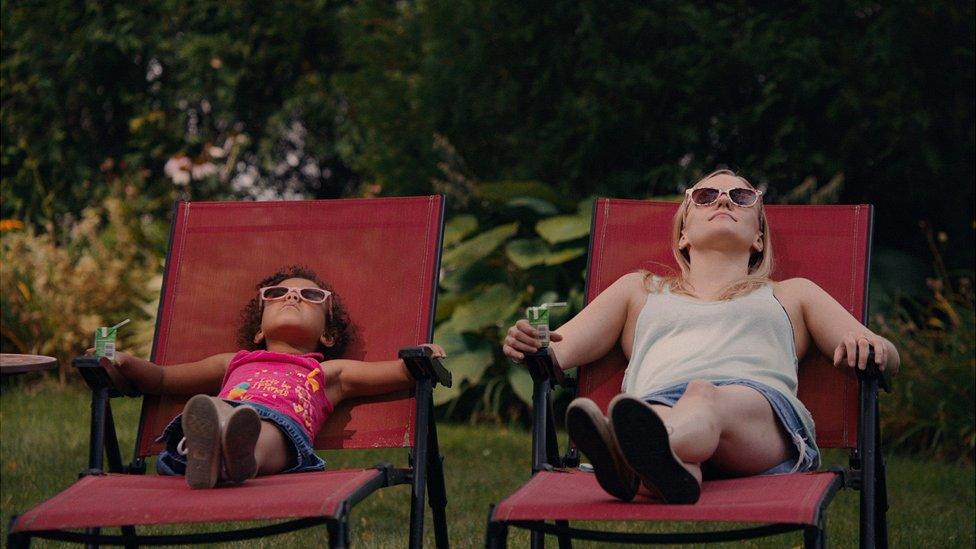
As Ramona hadn't yet turned six when she was cast as Frances, the director Alex Thompson said it was "a big gamble" but he was "certain she could pull it off"
There's the touching one with Bridget and Frances in a confessional booth; and the "did-she-really-just-say-that" one when Bridget's mother graphically describes what she wanted to do to her dear daughter when she was a baby. And then there's the one where Maya is called-out for breast-feeding in public, and another one after Jace and Bridget have made out for the first time (remember the Cameron Diaz "hair gel" scene in There's Something About Mary? Well, this one is a companion piece with blood as the bodily fluid).
The film's reserved tone is its greatest strength as well as its greatest weakness. It avoids the obvious pitfall of becoming sentimental or coy, but there are fleeting moments when the evenness of the story-telling verges on the monotonous. But, maybe that's intentional.
Normal life can be monotonous.
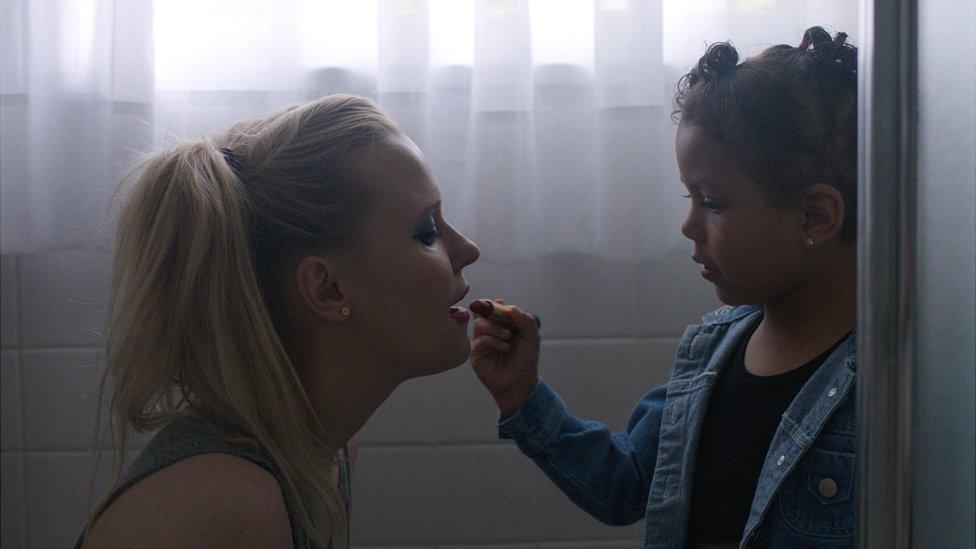
Kelly O'Sullivan says her character needs healing, which she gets from Frances, and the summer with her is a "huge blessing" for Bridget
And this is a film about normalising the life choices of a loosely connected group of normal middle-class Americans, facing normal middle-class American problems. Where it could shame, it understands; where it could browbeat, it subtly admonishes. It is a well-constructed, deftly told story that acts as a counterpoint to our increasingly vulgar culture.
An example of this is the way in which the movie deals with Bridget's choice not to go through with a pregnancy because she is not ready to have children, while at the same time developing a close relationship with Frances. Bridget is not presented as cold, or bitter, or desperate, which is often the case with thirty-something female characters who choose not to start a family. She is happy with her choice and also happy to enjoy loving a child without it been a surrogate or hers.
That's normal.
Saint Frances is smart and original and anti-sensationalist. It is also a very good film, which speaks to you but never shouts.
Recent reviews by Will Gompertz
Follow Will Gompertz on Twitter, external
